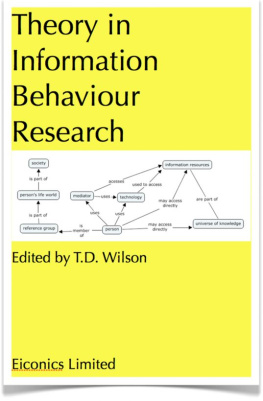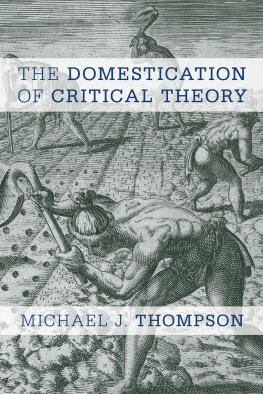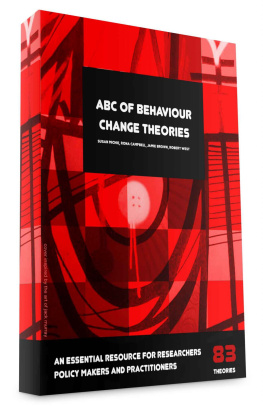Theoryin Information Behaviour Research
editedby
T.D.Wilson
Published byEiconics Limited at Smashwords
Copyright 2013 EiconicsLtd.
ISBN978-0-9574957-0-8
Thisebook is licensed for your personal use only. This ebook may not bere-sold or given away to other people. If you would like to sharethis book with another person, please purchase an additional copyfor each recipient. If youre reading this book and did notpurchase it, or it was not purchased for your use only, then pleasereturn to Smashwords.com and purchase your own copy. Thank you forrespecting the hard work of the contributors to thisbook.
Contents
The principles of activity theory
Activity theory in areas related to information behaviourresearch
Activity theory in information behaviourresearch
Conclusion
Introductory works and references
Chapter 2 - Critical theory by GeraldBenot
Introduction
Nature of origins of the theory
Current state of the theory
Applications
Conclusions
Introductory works and references
Chapter3 - Personal construct theory by RebeccaReynolds
Introduction
The application of personal construct theory in informationscience
Thetheory applied in other information scienceresearch
Conclusion
Introductory works and references
Chapter4 - Personality theory by Jannica Heinstrom
Introduction
Current state of the theory
Application in information behaviourresearch
Conclusion
Introductory works and references
Chapter5 - Practice theory by Andrew Cox
Introduction
Historical overview
Fourpre-occupations of the practice approach
Applications in information research
Applications to research in informationbehaviour
Evaluation
Conclusion
Introductory works and references
Chapter6 - Social cognitive theory by AgustaPalsdottir
Introduction
Social cognitive theory fundamentals
Applicability of social cognitivetheory
Conclusion
Introductory works and references
Chapter7 - Social phenomenology by T.D. Wilson & ReijoSavolainen
Introduction
Thebasic ideas of phenomenology
Typesexemplified The well-informed citizen
Social phenomenology
Regions of relevance
Social phenomenology as an integrative framework forinformation science
Social phenomenology in related fields information systemsand human-computer interaction
Criticism of social phenomenology
Conclusion
Introductory works and references
Chapter8 - Theoretical approaches in Russia and Eastern Europe by ElenaMaceviciute
Introduction
Research on information needs
Reading research
Information behaviour research
Conclusions
Introductory works and references
Contributors
Gerald Benot isan Associate Professor in computer science and in the GraduateSchool of Library and Information Science at Simmons College,Boston, Mass., USA. His research encompasses language modelsparticularly for biomedical and cross-language retrieval,interactive visualization, and the ethics of information systems.Prof. Benots lower degrees are in French and Russian, and higherdegrees from Columbia University (M.S.) and UCLA in informationscience (Ph.D.).
Andrew Cox hasbeen a lecturer in the Information School, University of Sheffieldsince 2006. His research is in the area of online community andsocial media, be that on the open Web (e.g., on Flickr), inorganizations (including communities of practice) or in learningcontexts. He holds a Humanities degree from the Open University;Masters degrees from the Open University, University of Sheffield,University of Aberystwyth and Thames Valley University, and adoctorate in Information Science from LoughboroughUniversity.
Jannica Heinstrm is a Senior Lecturer in Information Studies at bo AkademiUniversity, Finland. Currently she holds a Senior ResearchFellowship at the Institute for Advanced Social Research,University of Tampere (2012-2013). Her research interests lie inpsychological aspects of information behaviour, such aspersonality, motivation and emotion. In 2004-2008 she was avisiting scholar at the Center for International Scholarship inSchool Libraries (CISSL) at Rutgers, the State University of NewJersey, USA. Jannica holds a Masters degree in Psychology and aPhD in Information Studies.
Elena Maceviciute is Professor at the Swedish School of Library and InformationStudies, Bors University, Sweden and Professor in the Faculty ofCommunication, Vilnius University, Lithuania. Her research areasinclude reference work, information and communication needs,international and intercultural communication, and informationmanagement. Elena has worked as a consultant to the LithuanianMinistry of Culture, the Lithuanian National Commission for UNESCO,the Committee of Europe and others. She is Deputy Editor of thejournal Information Research
gsta Plsdttir is Professor at the Department of Library and InformationScience, University of Iceland, Reykjavk, Iceland, where she hasbeen employed since 1997. Her main research is in healthinformation behaviour, where she has investigated healthinformation seeking, choice of information sources and evaluationof information, as well as the associated social and psychologicalfactors. She has also investigated the information behaviour ofelderly persons and their relatives. gsta holds an MA degree fromthe University of Iceland and a doctoral degree from bo AkademiUniversity, Finland.
Rebecca Reynolds is Assistant Professor, School of Communication &Information at Rutgers, the State University of NJ, and affiliateof the Center for Inter-national Scholarship on SchoolLibrarianship. Funded by an Institute for Museum and LibraryServices early career development grant, she researches learning byyoung people during their active social media use and digital mediacontent creation, and issues of motivation, agency and structure inthe design of guided discovery-based e-learning interventions foryouth. Her research is. She holds a BA (Sociology), MA (MediaStudies) and a PhD (Mass Communication), with post-doctoral work inInformation Studies.
Reijo Savolainen is Professor in the School of Information Sciences,University of Tampere, Finland and holds a PhD from the sameinstitution. Reijos research has been mainly in the area ofinformation seeking behaviour and he is the author of Everyday Information Practices: A Social PhenomenologicalPerspective.
T.D. ( Tom) Wilson is Professor Emeritus, University of Sheffield and VisitingProfessor in the Universities of Bors (Sweden) and Leeds (UK). Hisresearch has spanned a number of areas including librarycooperation, information management and IT strategies and policies,but he is probably best know for his work in the field ofinformation behaviour. Tom holds a BSc in economics and sociologyfrom the University of London, a PhD from the University ofSheffield and honorary doctorates from the University of Gothenburgin Sweden and the University of Murcia in Spain.
Introduction
The aim in presenting thiscollection of essays on theoretical approaches in informationbehaviour research is quite simple; it is to provide a singlesource of information on these alternatives, which is readily (andcheaply) available to students and researchers.
The initialidea was to ask authors of papers in Information Research to develop the theoretical aspect of theirpapers, but it became evident that the structure of a chapter forthe purpose of presenting a theory could be very different fromthat of an original paper. Consequently, although a number ofchapters owe something to papers published in the journal andelsewhere, they are, in fact, entirely original.
In selectingthe topics for inclusion, consideration had to be given to what ismeant by theory . Anyresearcher will know that this is not word with any completelyaccepted meaning. Theory in the physical sciences is intended to bepredictive and testing a theory involves the collection of relevantquantitative data and, often, advanced mathematical techniques inthe analysis of data. It may also involve experiment and computersimulation.
Next page




